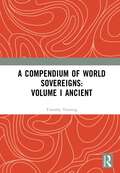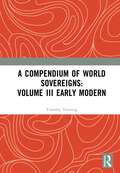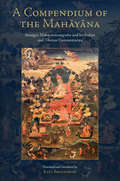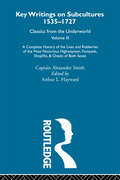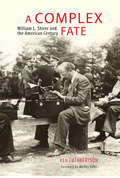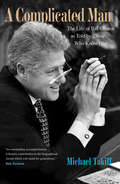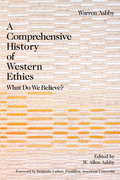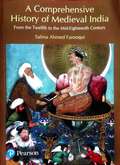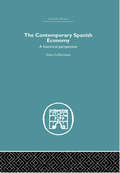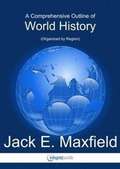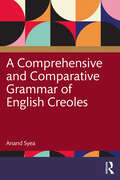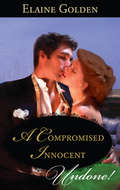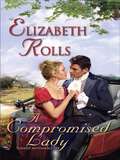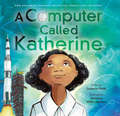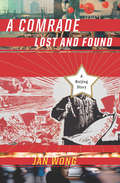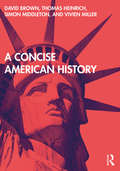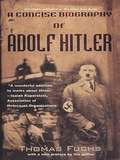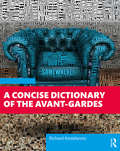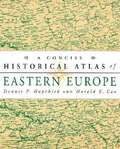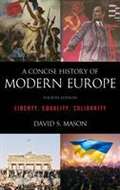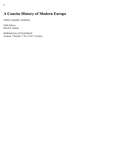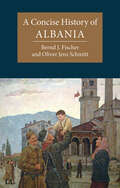- Table View
- List View
A Compendium of World Sovereigns: Volume I Ancient
by Timothy VenningThe Compendium of World Sovereigns series contains three volumes: Ancient, Medieval, and Early Modern. These volumes provide students with easy-to-access ‘who’s who’ with details on the identities and dates, ages and wives, where known, of heads of government in any given state at any time within the framework of reference. The relevant original and secondary sources are also listed in a comprehensive bibliography. Providing a clear reference guide for students, to who was who and when they ruled in the dynasties and other ruler-lists for the Ancient, Medieval, and Early Modern worlds – primarily European and Middle Eastern but including available information on Africa and Asia and the pre-Columbian Americas. The trilogy accesses and interprets the original data plus any modern controversies and disputes over names and dating, reflecting on the shifts and widening of focus in student and academic studies. Each volume contains league tables of rulers’ ‘records’, and an extensive bibliographical guide to the relevant personnel and dynasties, plus any controversies, so readers can consult these for extra details and know exactly where to go for which information. All relevant information is collected and provided as a one-stop-shop for students wishing to check the known information about a world Sovereign. The Ancient volume begins with the Pharaohs in Egypt and moves through Greece, Classical and Early Medieval Armenia, Crimea, Syria, Jordan, Israel and Judah, Persia, India and ends with the Roman World in the east and west. A Compendium of World Sovereigns: Volume I Ancient provides students and scholars with the perfect reference guide to support their studies and to fact check dates, people, and places.
A Compendium of World Sovereigns: Volume III Early Modern
by Timothy VenningThe Compendium of World Sovereigns series contains three volumes: Ancient, Medieval, and Early Modern. These volumes provide students with easy-to-access ‘who’s who’ with details on the identities and dates, ages and wives, where known, of heads of government in any given state at any time within the framework of reference. The relevant original and secondary sources are also listed in a comprehensive bibliography. Providing a clear reference guide for students, to who was who and when they ruled in the dynasties and other ruler-lists for the Ancient, Medieval, and Early Modern worlds – primarily European and Middle Eastern but including available information on Africa and Asia and the pre-Columbian Americas. The trilogy accesses and interprets the original data plus any modern controversies and disputes over names and dating, reflecting on the shifts and widening of focus in student and academic studies. Each volume contains league tables of rulers’ ‘records’, and an extensive bibliographical guide to the relevant personnel and dynasties, plus any controversies, so readers can consult these for extra details and know exactly where to go for which information. All relevant information is collected and provided as a one-stop-shop for students wishing to check the known information about a world Sovereign. The Early Modern volume begins with Eastern and Western Europe and moves through the Ottoman Empire, South and East Asia, Africa, and ends in Central and South America. Compendium of World Sovereigns: Volume III Early Modern provides students and scholars with the perfect reference guide to support their studies and to fact check dates, people, and places.
A Compendium of the Mahayana: Asanga's Mahayanasamgraha and Its Indian and Tibetan Commentaries (Tsadra)
by AsangaThe first complete English translation of Asanga's Mahayanasamgraha, the most important and comprehensive Indian Yogacara text, and all its available Indian commentaries.The Mahāyānasaṃgraha, published here with its Indian and Tibetan commentaries in three volumes, presents virtually everything anybody might want to know about the Yogācāra School of mahāyāna Buddhism. It discusses in detail the nature and operation of the eight kinds of consciousness, the often-misunderstood notion of “mind only” (cittamātra), dependent origination, the cultivation of the path and its fruition in terms of the four wisdoms, and the three bodies (kāyas) of a buddha.Volume 1 presents the translation of the Mahāyānasaṃgraha along with a commentary by Vasubandhu. The introduction gives an overview of the text and its Indian and Tibetan commentaries, and explains in detail two crucial elements of the Yogācāra view: the ālaya-consciousness and the afflicted mind (kliṣṭamanas).Volume 2 presents translations of the commentary by Asvabhāva and an anonymous Indian commentary on the first chapter of the text. These translations are supplemented in the endnotes by excerpts from Tibetan commentaries and related passages in other Indian and Chinese Yogācāra works.Volume 3 includes appendices with excerpts from other Indian and Chinese Yogācāra texts and supplementary materials on major Yogācāra topics in the Mahāyānasaṃgraha.
A Complete History of the Lives and Robberies of the Most Notorious Highwaymen, Footpads, Shoplifts and Cheats of Both Sexes: Previously published 1719 and 1926 (Key Writings On Subcultures, 1535-1727 Ser. #Vol. 3)
by Captain Alexander SmithA Complete History of the Highwaymen discloses the most secret and barbarous murders, unparalleled robberies, notorious thefts and unheard of cheats, setting them in a true light and exposing them to public view for the common benefit of mankind. The accounts and confessions are drawn from imprisoned villains who awaited their fate at the gallows. This reprint makes available the 1926 reissue of Captain Smith's fifth edition and includes an introduction by Arthur L. Hayward, which sets the accounts in the appropriate historical context.
A Complex Fate: William L. Shirer and the American Century (ISSN)
by Ken CuthbertsonWilliam Shirer (1904-1993), a star foreign correspondent with the Chicago Tribune in the 1920s and ’30s, was a prominent member of what one contemporary observer described as an extraordinary band of American journalists, "some with the Midwest hayseed still in their hair," who gave their North American audiences a visceral sense of how Europe was spiralling into chaos and war. In 1937, Shirer left print journalism and became the first of the now legendary "Murrow boys," working as an on-air partner to the iconic CBS broadcaster Edward R. Murrow. With Shirer reporting from inside Nazi Germany and Murrow from blitz-ravaged London, the pair built CBS’s European news operation into the industry leader and, in the process, revolutionized broadcasting. But after the war ended, the Shirer-Murrow relationship shattered. Shirer lost his job and by 1950 found himself blacklisted as a supposed Communist sympathizer. After nearly a decade in the professional wilderness, he began work on The Rise and Fall of the Third Reich. Published in 1960, Shirer's magnum opus sold millions of copies and was hailed as the masterwork that would "ensure his reputation as long as humankind reads." Ken Cuthbertson's A Complex Fate is a thought-provoking, richly detailed biography of William Shirer. Written with the full cooperation of Shirer’s family, and generously illustrated with photographs, it introduces a new generation of readers to a supremely talented, complex writer, while placing into historical context some of the pivotal media developments of our time.
A Complicated Man: The Life of Bill Clinton as Told by Those Who Know Him
by Michael Takiff&“An astonishing collection of 171 interviews with Clinton&’s friends, foes, admirers, and detractors as well as reporters and political analysts.&”—Booklist (starred review). Though Bill Clinton has been out of office since 2001, public fascination with him continues unabated. Many books about Clinton have been published in recent years, but shockingly, no single-volume biography covers the full scope of Clinton&’s life from the cradle to the present day, not even Clinton&’s own account, My Life. More troubling still, books on Clinton have tended to be highly polarized, casting the former president in an overly positive or negative light. In this, the first complete oral history of Clinton&’s life, historian Michael Takiff presents the first truly balanced book on one of our nation&’s most controversial and fascinating presidents. Through more than 150 chronologically arranged interviews with key figures—including Bob Dole, James Carville, and Tom Brokaw, among many others—A Complicated Man goes far beyond the well-worn party-line territory to capture the larger-than-life essence of Clinton the man. With the tremendous attention given to the Lewinsky scandal, it is easy to overlook the president&’s humble upbringing, as well as his many achievements at home and abroad: the longest economic boom in American history, a balanced budget, successful intervention in the Balkans, and a series of landmark, if controversial, free-trade agreements. Through the candid recollections of Takiff&’s many subjects, A Complicated Man leaves no area unexplored, revealing the most complete and unexpected portrait of our forty-second president published to date. &“Packed with fascinating personal perspective and testimony.&”—Nigel Hamilton, bestselling and award-winning author of American Caesars
A Complicated War: The Harrowing of Mozambique (Perspectives on Southern Africa #47)
by William FinneganPowerful, instructive, and full of humanity, this book challenges the current understanding of the war that has turned Mozambique—a naturally rich country—into the world's poorest nation. Before going to Mozambique, William Finnegan saw the war, like so many foreign observers, through a South African lens, viewing the conflict as apartheid's "forward defense." This lens was shattered by what he witnessed and what he heard from Mozambicans, especially those who had lived with the bandidos armado, the "armed bandits" otherwise known as the Renamo rebels. The shifting, wrenching, ground-level stories that people told combine to form an account of the war more local and nuanced, more complex, more African—than anything that has been politically convenient to describe.A Complicated War combines frontline reporting, personal narrative, political analysis, and comparative scholarship to present a picture of a Mozambique harrowed by profound local conflicts—ethnic, religious, political and personal. Finnegan writes that South Africa's domination and destabilization are basic elements of Mozambique's plight, but he offers a subtle description and analysis that will allow us to see the post-apartheid region from a new, more realistic, if less comfortable, point of view.
A Comprehensive History Of Western Ethics
by Warren AshbyOur intellectual history spans more than 2,000 years, yet, surprisingly, we have had no adequate history of Western ethics. A Comprehensive History of Western Ethics fills this void by providing an engaging, thorough, and inclusive history that encompasses both classical and modern perspectives. Author Warren Ashby speaks both to students of history and ethics and to a public interested in but often perplexed by moral values in contemporary life. Ashby embraces all who are concerned with expanding human rights, finding new ways to think about moral experience, and discovering an ethical perspective appropriate for their lives. By exploring past ethical problems, we can prepare for the future's challenges.Included with the commentary on the writings of great thinkers are in-depth discussions of Greek, biblical, and Stoic ethics; Augustine, Aquinas, and medieval views; the Renaissance, the Reformation, and ethics in the age of science; as well as the Enlightenment, Romanticism, and the last Western century.
A Comprehensive History of Medieval India: From the Twelfth to the Mid-Eighteenth Century
by Salma Ahmed Farooqui"A Comprehensive History of Medieval India From the Twelfth to the Mid-Eighteenth Century" by Salma Ahmed Farooqui provides a detailed exploration of the socio-political, economic, and cultural developments in medieval India. Farooqui meticulously examines the period from the 12th to the mid-18th century, covering the rise and fall of various dynasties, the impact of invasions and conquests, and the transformation of society and administration. The book delves into the rich tapestry of medieval Indian history, addressing key events such as the Delhi Sultanate, the Mughal Empire, and the regional kingdoms. It also sheds light on the interactions between different religious and cultural communities, providing a nuanced understanding of the diverse and complex dynamics that shaped this crucial era in Indian history.
A Comprehensive History of the Woollen and Worsted Manufacturers: A Historical Perspective
by J. BischoffFirst Published in 1968. Routledge is an imprint of Taylor & Francis, an informa company.
A Comprehensive Outline of World History
by Jack MaxfieldThis course presents Jack E. Maxfield's "A Comprehensive Outline of World History" as originally organized, chronologically by era and across regions within an era.
A Comprehensive and Comparative Grammar of English Creoles
by Anand SyeaA Comprehensive and Comparative Grammar of English Creoles provides a detailed, comprehensive description of the morphology, grammar, and syntax of a selected number of English creoles, including those spoken on both sides of the Atlantic and the Pacific. This book: • Focuses on a number of traditional grammatical categories to provide a comprehensive description and discussion of these languages; • Identifies not only how creoles differ from their lexifier, but also how they differ from one another; • Provides effective comparative descriptions to enable an insightful understanding of language evolution. This book will be ideal supplementary reading for students and researchers of linguistics, and will particularly appeal to those with an interest in descriptive linguistics, historical linguistics, World Englishes, contact and creole linguistics, and language policy and planning.
A Compromised Innocent
by Elaine GoldenUnder intense pressure to secure a marriage contract, Miss Lizzie Talbot doesn't dare hope that handsome Oliver Fortney, Duke of Wainsborough, would ever be interested in her. Though she longs to know his taste and touch, he is far above her station. So Lizzie is shocked when Oliver promises to show her pleasure she never imagined… Yet she doesn't expect more than a brief dalliance. For Oliver is destined for a match of importance and wealth, neither of which Lizzie can offer…
A Compromised Lady
by Elizabeth RollsA woman forced to marry for her inheritance fears revealing her dark past to her prospective husband in this Regency romance.As a girl she had been bubbling over with mischief.As a woman she seemed half lost in shadow. But Richard Blakehurst couldn’t miss the flash of connection between them when his hand touched hers. It was as if he had awakened something deep inside her.Seeing Richard again brought back the taunting memory of their dance at her coming-out ball. She must tame her wayward thoughts, because Thea doubted even her considerable fortune could buy Richard’s good opinion of her if ever he learnt the truth. . . .
A Computer Called Katherine: How Katherine Johnson Helped Put America on the Moon
by Suzanne SladeThe inspiring true story of mathematician Katherine Johnson--made famous by the award-winning film Hidden Figures--who counted and computed her way to NASA and helped put a man on the moon!Katherine knew it was wrong that African Americans didn't have the same rights as others--as wrong as 5+5=12. She knew it was wrong that people thought women could only be teachers or nurses--as wrong as 10-5=3. And she proved everyone wrong by zooming ahead of her classmates, starting college at fifteen, and eventually joining NASA, where her calculations helped pioneer America's first manned flight into space, its first manned orbit of Earth, and the world's first trip to the moon!Award-winning author Suzanne Slade and debut artist Veronica Miller Jamison tell the story of a NASA "computer" in this smartly written, charmingly illustrated biography.
A Comrade Lost and Found: A Beijing Memoir
by Jan WongA &“suspenseful, elegantly written&” account of the author&’s return to China after thirty years to search for the woman she betrayed to the authorities (Publishers Weekly, starred review). In the early 1970s, at the height of the Cultural Revolution, Jan Wong traveled from Canada to Beijing University—where she would become one of only two Westerners permitted to study. One day a fellow student, Yin Luoyi, asked for her help getting to the United States. Wong, then a starry-eyed Maoist from Montreal, immediately reported her to the authorities, and shortly thereafter Yin disappeared. Thirty-three years later, hoping to make amends, Wong revisits the Chinese capital to search for the person who has haunted her conscience. At the very least, she wants to discover whether Yin survived. But Wong finds the new Beijing bewildering. Phone numbers, addresses, and even names change with startling frequency. In a society determined to bury the past, Yin Luoyi will be hard to find. As Wong traces her way from one former comrade to the next, she unearths not only the fate of the woman she betrayed but the strange and dramatic transformation of contemporary China. In this memoir, she tells how her journey rekindled all of her love for—and disillusionment with—her ancestral land. &“Gone is the semirural capital where the author&’s &‘revolutionary&’ course of study included bouts of hard labor and &‘self criticism&’ sessions. In its place are eight-lane expressways lit up &‘like Christmas trees,&’ shiny skyscrapers and the largest shopping mall in the world. Wong is a gifted storyteller, and hers is a deeply personal and richly detailed eyewitness account of China&’s journey to glossy modernity.&” —Publishers Weekly, starred review
A Conceptual History of Psychology: Exploring the Tangled Web
by John D. GreenwoodIn the new edition of this original and penetrating book, John D. Greenwood provides an in-depth analysis of the subtle conceptual continuities and discontinuities that inform the history of psychology from the speculations of the Ancient Greeks to contemporary cognitive psychology. He also demonstrates the fashion in which different conceptions of human and animal psychology and behavior have become associated and disassociated over the centuries. Moving easily among psychology, history of science, physiology, and philosophy, Greenwood provides a critically challenging account of the development of psychology as a science. He relates the remarkable stories of the intellectual pioneers of modern psychology, while exploring the social and political milieu in which they operated, and dispels many of the myths of the history of psychology, based upon the best historical scholarship of recent decades. This is an impressive overview that will appeal to scholars and graduate students of the history of psychology.
A Concise American History
by David Brown Simon Middleton Vivien Miller Thomas HeinrichExpertly steering readers through the often tumultuous and exhilarating history of the United States, from its early modern Native American roots to twenty-first-century neoliberalism and the shifting political climate of the past decade, this highly readable textbook provides a compelling overview of American development over the last five centuries. This book avoids either celebratory or condemnatory rhetoric to present a critical examination of domestic America and its interaction with the rest of the world. Balancing coverage of political, social, cultural, and economic history, each chapter also includes a wealth of features to facilitate learning: Timelines situating key events in their wider chronology Lists of topics covered within each chapter for easy reference Concept boxes discussing selected issues in more detail Historiography boxes exploring key debates Chapter summaries offering condensed outlines of the main themes of each chapter Further reading lists guiding readers to additional resources Maps and images bringing to life important events and figures from America’s history Clearly and engagingly written and positioning America’s narrative within the wider global context, this textbook is particularly accessible for non-US students and is the perfect introduction for those new to US history. This textbook is also supported by a companion website offering interactive content including a timeline, multiple-choice quizzes, and links to selected web resources.
A Concise Biography of Adolf Hitler
by Thomas Fuchs"Four Stars." --West Coast Review of Books "Fascinating reading." --Booklist "An engrossing book...excellent." --Oahu Sun Press
A Concise Dictionary of the Avant-Gardes: Concise Edition
by Richard KostelanetzFor a concise edition of his legendary arts dictionary of information and opinion, the distinguished critic and arts historian Richard Kostelanetz selects entries from the 2018 third edition. Typically he provides intelligence unavailable anywhere else, no less in print than online, about a wealth of subjects and individuals. Focused upon what is truly innovative and excellent, Kostelanetz also ranges widely with insight and surprise, including appreciations of artistic athletes such as Muhammad Ali and the Harlem Globetrotters and such collective creations as Las Vegas and his native New York City. Continuing the traditions of cheeky high-style Dictionarysts, honoring Ambrose Bierce and Samuel Johnson (both with individual entries), Kostelanetz offers a "reference book" to be enjoyed, not only in bits and chunks but continuously as one of the ten books someone would take if he or she planned to be stranded on a desert isle.
A Concise Historical Atlas of Eastern Europe
by Dennis P. Hupchick Harold E. CoxThis atlas is concerned with the part of Europe extending from the Balkan Peninsula in the south to Poland and Lithuania in the north.
A Concise History Of Modern Europe: Liberty, Equality, Solidarity
by David MasonHighlighting the key events, ideas, and individuals that have shaped modern Europe, this fresh and lively book provides a concise history of the continent from the Enlightenment to the present. <p><p> Drawing on the enduring theme of revolution, David S. Mason explores the political, economic, and scientific causes and consequences of revolution; the development of human rights and democracy; and issues of European identity and integration. He deliberately avoids a detailed chronology of every country and time period, instead emphasizing the most crucial events in shaping contemporary Europe. <p> Fourteen focused chapters address such topical issues as the Enlightenment; the French Revolution and Napoleon; the Industrial Revolution; the theories and impact of Marx and Darwin; the revolutions of 1848, 1917, and 1989; the unifications of Germany and Italy; European imperialism; the two world wars; the Cold War; the evolution and expansion of the European Union; and current issues confronting Europe. Any reader who wants to view the broad sweep of European history will find this book an engaging narrative, supplemented with maps, timelines, sidebars, photos, and a glossary.
A Concise History Of Modern Europe: Liberty, Equality, Solidarity
by David S. MasonHighlighting the key events, ideas, and individuals that shaped modern Europe, this lively book provides a concise history of the continent from the Enlightenment to the present day. Drawing on the enduring theme of revolution, David S. Mason explores the political, economic, and scientific causes and consequences of revolution; the development of human rights and democracy; and issues of European identity and integration. He deliberately avoids a detailed chronology of every country and time period, instead emphasizing the most crucial events in shaping contemporary Europe. Fourteen focused chapters address such topical issues as the Enlightenment; the French Revolution and Napoleon; the Industrial Revolution; the theories and impact of Marx and Darwin; the revolutions of 1848, 1917, and 1989; the unifications of Germany and Italy; European imperialism; the two world wars; the Cold War; the evolution and expansion of the European Union; and current issues confronting Europe. Any reader who wants to view the broad sweep of European history will find this book an engaging narrative, supplemented with maps, timelines, sidebars, photos, and a glossary.
A Concise History of Albania (Cambridge Concise Histories)
by Bernd J. Fischer Oliver Jens SchmittA Concise History of Albania charts the history of Albania and its people, within their Balkan and European contexts. It shows the country's journey from its ancient past, still shrouded in mystery and controversy, through its difficult transition from a particularly brutal form of communism to an evolving form of democracy and a market economy. Bernd Fischer and Oliver Schmitt challenge some of the traditional narratives concerning the origins of the Albanians, and the relations between Albanians and their Balkan neighbours. This authoritative and up-to-date single-volume history analyses the political, social, economic, and cultural developments which led to the creation of the Albanian state and the modern nation, as well as Albania's more recent experience with authoritarianism, war, and communism. It greatly contributes to our understanding of the challenges facing contemporary Albanians, as well as the issues confronting the region as a whole as it attempts to grapple with one of the last remaining significant ethnic issues in the Balkans.
A Concise History of American Painting and Sculpture
by Matthew BaigellThis clear, thorough and reliable survey of American painting and sculpture from colonial times to the present day covers all the major artists and their works, and outlines the social and cultural background of each period.
